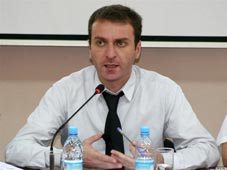Baindurashvili’s positive outlook
By Messenger Staff
Wednesday, February 9

Minister Baindurashvili highlighted several important issues including fiscal policy and the directions of the country’s further development. He discussed issues such as fiscal deficit and the national debt. According to Baindurashvili Georgia’s economy has succeeded in returning to economic growth following the global economic crisis, and last year our economy increased by approximately 6%. Thus, unlike other countries in Europe and elsewhere around the world that were hard hit by the crisis, Georgia’s path towards recovery and economic growth has been rapid. Baindurashvili stressed that even in 2009, when the crisis was at its peak Georgia experienced a decline in its economy of approximately only 4%.
“The main reason why Georgia succeeded in escaping the crisis was fiscal and indirect fiscal stimulation, which we were able to implement after receiving USD 4.5 billon in an international post-war assistance package,” Baindurashvili explained, adding that the estimated economic growth for Georgia in 2011 lies between 4.5 and 6.5%.
The Minister said that in the circumstances of economic growth, total governmental expenditure will be 31.2% of GDP; last year it was 34.6%, and 2009 saw the highest figure of recent years – 37.2% of GDP, which was related to economic stimulation measures. “Looking ahead, government expenditure will decrease further, and at this stage we estimate that expenses will not exceed 30% in 2012, and by 2013 will actually decrease to 27.5%,” the minister said.
Speaking on the impact of the deficit on inflation he said that it falls only within 80 million GEL, i.e., the budget is neutral with regard to inflation, as about 850 million GEL comes in the form of foreign currency and is later converted into GEL. However, the same amount is converted into foreign currency and flows out of monetary stock. Furthermore, Georgia did not end January 2011 with a little deficit, but rather a surplus of 36 million GEL.
The Finance Minister talked about the projects planned for the future explaining that they will focus on the growth of specific sectors, opportunities for the generation of employment and incomes. “For example, we are in active cooperation with the Asian Development Bank on projects that aim to increase tourism and as a consequence there will be opportunities for companies working in this sector (e.g. bank protection). In addition, together with the World Bank, we are considering a new initiative that would provide additional support for regional development projects,” Baindurashvili stated.
Speaking on the national debt, Baindurashvili said that Georgia has a clearly formulated policy, which can be expressed as follows: “Our target is to keep national debt at a maximum of 60% against total GDP. However, it is also our task not let this amount exceed 45% during normal conditions so that we have room to manoeuver in the event of another crisis situation. At present, national debt – both domestic and foreign - doesn’t exceed 47%. However, if we consider that the foreign debt consists mostly of debt inherited from the Soviet Union – the so called “historic debt”, the foreign debt of the country is only 38%,” the minister stated.
Minister also touched upon investment issues and said that they will also focus on investing in those branches where the signs of potential growth are clearly visible; these are: logistics, pharmaceuticals, textiles, construction materials, to name a few.
Minister emphasised his attention to the tax policy and said that the major goal is to make sovereign companies far more effective. “Once this is achieved, we can begin to make basic investments that are required for the further development of such businesses,” he said. “Our aim is to create a business environment in which the businessman/woman does not consider tax legislation as a risk-factor and will not be afraid to make an investment decision, but on the contrary, will be in partnership with the tax service,” the minister continued.
He also spoke about the new innovations introduced in the Tax Code. The minister gave examples: companies with turnovers exceeding 200,000 GEL do not have to pay VAT at customs; a Tax Ombudsman has been appointed. He added that the ministry successfully introduced a “GOOD FAITH” principle in practice and already there are many companies, which have tested this principle in reality. Baindurashvili said that advance tax rulings have been introduced, as well as personal tax agents; in addition warnings instead of penalties being issued and other changes are been undertaken.
